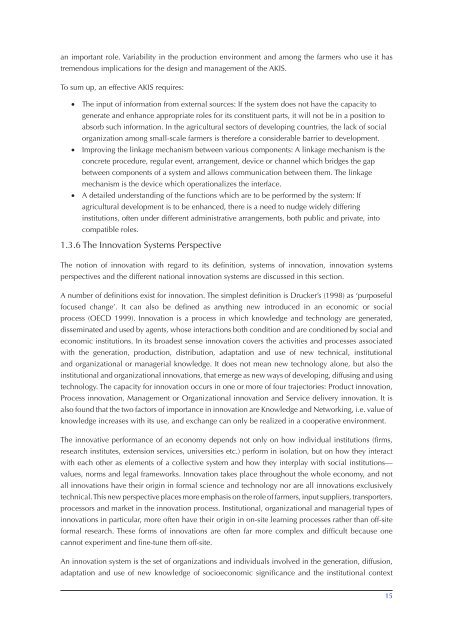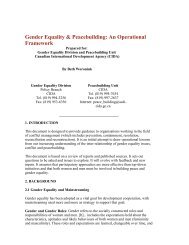Concepts and practices in agricultural extension in developing ...
Concepts and practices in agricultural extension in developing ...
Concepts and practices in agricultural extension in developing ...
- No tags were found...
Create successful ePaper yourself
Turn your PDF publications into a flip-book with our unique Google optimized e-Paper software.
an important role. Variability <strong>in</strong> the production environment <strong>and</strong> among the farmers who use it hastremendous implications for the design <strong>and</strong> management of the AKIS.To sum up, an effective AKIS requires:• The <strong>in</strong>put of <strong>in</strong>formation from external sources: If the system does not have the capacity togenerate <strong>and</strong> enhance appropriate roles for its constituent parts, it will not be <strong>in</strong> a position toabsorb such <strong>in</strong>formation. In the <strong>agricultural</strong> sectors of develop<strong>in</strong>g countries, the lack of socialorganization among small-scale farmers is therefore a considerable barrier to development.• Improv<strong>in</strong>g the l<strong>in</strong>kage mechanism between various components: A l<strong>in</strong>kage mechanism is theconcrete procedure, regular event, arrangement, device or channel which bridges the gapbetween components of a system <strong>and</strong> allows communication between them. The l<strong>in</strong>kagemechanism is the device which operationalizes the <strong>in</strong>terface.• A detailed underst<strong>and</strong><strong>in</strong>g of the functions which are to be performed by the system: If<strong>agricultural</strong> development is to be enhanced, there is a need to nudge widely differ<strong>in</strong>g<strong>in</strong>stitutions, often under different adm<strong>in</strong>istrative arrangements, both public <strong>and</strong> private, <strong>in</strong>tocompatible roles.1.3.6 The Innovation Systems PerspectiveThe notion of <strong>in</strong>novation with regard to its def<strong>in</strong>ition, systems of <strong>in</strong>novation, <strong>in</strong>novation systemsperspectives <strong>and</strong> the different national <strong>in</strong>novation systems are discussed <strong>in</strong> this section.A number of def<strong>in</strong>itions exist for <strong>in</strong>novation. The simplest def<strong>in</strong>ition is Drucker’s (1998) as ‘purposefulfocused change’. It can also be def<strong>in</strong>ed as anyth<strong>in</strong>g new <strong>in</strong>troduced <strong>in</strong> an economic or socialprocess (OECD 1999). Innovation is a process <strong>in</strong> which knowledge <strong>and</strong> technology are generated,dissem<strong>in</strong>ated <strong>and</strong> used by agents, whose <strong>in</strong>teractions both condition <strong>and</strong> are conditioned by social <strong>and</strong>economic <strong>in</strong>stitutions. In its broadest sense <strong>in</strong>novation covers the activities <strong>and</strong> processes associatedwith the generation, production, distribution, adaptation <strong>and</strong> use of new technical, <strong>in</strong>stitutional<strong>and</strong> organizational or managerial knowledge. It does not mean new technology alone, but also the<strong>in</strong>stitutional <strong>and</strong> organizational <strong>in</strong>novations, that emerge as new ways of develop<strong>in</strong>g, diffus<strong>in</strong>g <strong>and</strong> us<strong>in</strong>gtechnology. The capacity for <strong>in</strong>novation occurs <strong>in</strong> one or more of four trajectories: Product <strong>in</strong>novation,Process <strong>in</strong>novation, Management or Organizational <strong>in</strong>novation <strong>and</strong> Service delivery <strong>in</strong>novation. It isalso found that the two factors of importance <strong>in</strong> <strong>in</strong>novation are Knowledge <strong>and</strong> Network<strong>in</strong>g, i.e. value ofknowledge <strong>in</strong>creases with its use, <strong>and</strong> exchange can only be realized <strong>in</strong> a cooperative environment.The <strong>in</strong>novative performance of an economy depends not only on how <strong>in</strong>dividual <strong>in</strong>stitutions (firms,research <strong>in</strong>stitutes, <strong>extension</strong> services, universities etc.) perform <strong>in</strong> isolation, but on how they <strong>in</strong>teractwith each other as elements of a collective system <strong>and</strong> how they <strong>in</strong>terplay with social <strong>in</strong>stitutions—values, norms <strong>and</strong> legal frameworks. Innovation takes place throughout the whole economy, <strong>and</strong> notall <strong>in</strong>novations have their orig<strong>in</strong> <strong>in</strong> formal science <strong>and</strong> technology nor are all <strong>in</strong>novations exclusivelytechnical. This new perspective places more emphasis on the role of farmers, <strong>in</strong>put suppliers, transporters,processors <strong>and</strong> market <strong>in</strong> the <strong>in</strong>novation process. Institutional, organizational <strong>and</strong> managerial types of<strong>in</strong>novations <strong>in</strong> particular, more often have their orig<strong>in</strong> <strong>in</strong> on-site learn<strong>in</strong>g processes rather than off-siteformal research. These forms of <strong>in</strong>novations are often far more complex <strong>and</strong> difficult because onecannot experiment <strong>and</strong> f<strong>in</strong>e-tune them off-site.An <strong>in</strong>novation system is the set of organizations <strong>and</strong> <strong>in</strong>dividuals <strong>in</strong>volved <strong>in</strong> the generation, diffusion,adaptation <strong>and</strong> use of new knowledge of socioeconomic significance <strong>and</strong> the <strong>in</strong>stitutional context15





